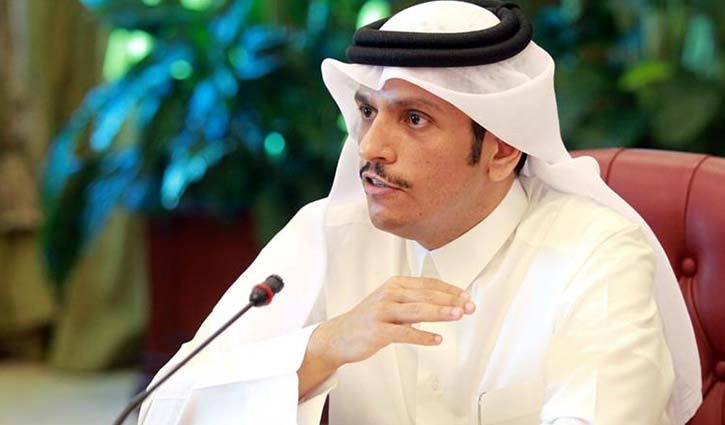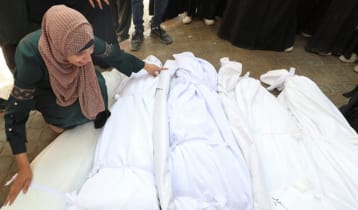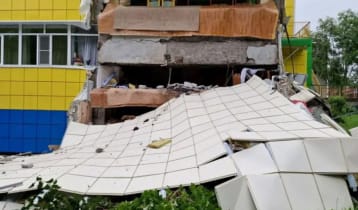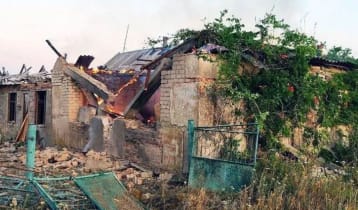‘No negotiation until sanctions dropped’
5 || risingbd.com

International Desk: Qatar will not negotiate with Gulf states that have cut economic and travel ties with it unless they reverse their sanctions, its foreign minister has said.
Sheikh Mohammed bin Abdulrahman al-Thani said on Monday that Qatar had still not received any demands from Saudi Arabia, the United Arab Emirates and Bahrain, which severed relations two weeks ago, triggering the worst Gulf Arab crisis in years.
The UAE, Saudi Arabia, Egypt and Bahrain have all imposed an embargo on Qatar, accusing the Gulf state of funding terrorism and fomenting regional unrest, charges Doha denies.
“Qatar is under blockade, there is no negotiation. They have to lift the blockade to start negotiations,” Thani told reporters in Doha. “Until now we didn’t see any progress about lifting the blockade, which is the precondition for anything to move forward.”
His comments came as the United Arab Emirates warned that the isolation of Qatar by its fellow Gulf States could last for years unless Doha accepts demands, which Arab powers plan to reveal in coming days.
The UAE foreign minister, Anwar Gagash, said: “Qatar will realise that this is a new state of affairs and isolation can last years.
“If they want to be isolated because of their perverted view of what their political role is, then let them be isolated. They are still in a phase of denial and anger.”
He said the Gulf states will set out their specific list of demands in a few days, but similar promises to produce a route map to a settlement have not materialised, making the task of mediation harder.
Thani said Kuwait’s ruler was the sole mediator in the crisis and that he was waiting for specific demands from Gulf states to take resolution efforts forward.
“We cannot just have (vague) demands such as ‘the Qataris know what we want from them, they have to stop this or that, they have to be monitored by a foreign monitoring mechanism,’” he added.
The deadline given for Qataris to leave neighbouring Gulf Arab states came into effect on Monday. The states had also urged their own citizens in Qatar to leave and threatened imprisonment and fines for anyone who criticised the measures.
“Saudi, Emirati, and Bahraini families are being forcibly recalled by their governments today, despite being invited to stay by the government of Qatar,” said Thani.
“The social fabric of the Gulf Cooperation Council population is being torn apart for political reasons and we will not allow ourselves to be a party to this injustice.”
So far Qatar has survived the land and air embargo, partly due to help from Iran and Turkey, but the CEO of Qatar Airlines, Akbar Al Baker, warned on Monday the dispute would leave “a lasting wound”.
There are also reports that shortages of US dollars have hit money exchange houses in Qatar as foreign banks scale back business with Doha. Qatar’s currency, the riyal, is pegged to the dollar.
In a sign of the dispute’s wider regional reverberations, Turkish troops arrived in Qatar to take part in joint training exercises.
The first drills took place on Sunday at the Tariq bin Ziyad military base in Doha, the Qatar defence ministry said in a statement.
Turkey, one of Qatar’s strongest allies, has offered diplomatic support and flown in fresh dairy produce to get around the blockade.
Although the military drills had been “planned for some time” according to the Qatari defence ministry, the message of cohesion is significant given the extent to which both sides have been anxious to demonstrate how they are winning international support.
The Turkish president, Recep Tayyip Erdoğan, has been outspoken in his support for the Qatari cause, condemning the Saudi-led blockade as “almost like a death sentence” for Qatar.
“Qatar is not the one who supports terrorism, quite the opposite,” he said last week. “Along with Turkey, it is the country with the most resolute stance against Isis which has caused grave damage to our region.”
Ankara and Doha are closely aligned on a number of diplomatic and economic fronts, with neither regarding the Muslim Brotherhood or Hamas as “terrorist organisations”. Qatar has also invested heavily in Turkey.
Agencies
risingbd/DHAKA/June 20, 2017/Amirul
risingbd.com



















